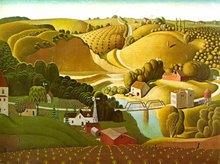In Praise Of Hunting
I found this on the Op-Ed page of The New York Times:
"EVERY year, 15 million licensed hunters head into America’s forests and fields in search of wild game. In New York State alone, roughly half a million hunters harvest around 190,000 deer in the fall deer hunting season — that’s close to eight million pounds of venison. In the traditional vernacular, we’d call that “game meat.” But, in keeping with the times, it might be better to relabel it as free-range, grass-fed, organic, locally produced, locally harvested, sustainable, native, low-stress, low-impact, humanely slaughtered meat.
That string of adjectives has been popularized in recent years by the various food-awareness movements, particularly “localism.” Like many popular social movements, localism’s rallying cry is one of well-founded disgust: the average American meal travels 1,500 miles from field to fork, consuming untold gallons of chemical fertilizer, pesticides and fossil fuels along the way.
As a remedy, so-called locavores encourage a diet coming from one’s own “foodshed” — usually within 100 or 300 miles of home. The rationale of localism is promoted in popular books and Web sites: it leads to a healthier lifestyle and diet; brings money to rural communities; promotes eating meat from animals that are able to “carry out their natural behaviors” and “eat a natural diet”; allows consumers to visit the places where their food is raised; supports the production of foods that have fewer chemical fertilizers and pesticides; and it keeps us in touch with the seasons.
While those sound suspiciously similar to the reasons many Americans choose to hunt, the literature of localism neglects the management and harvest of wildlife. This is a shame, because hunters are the original locavores. When I was growing up in Michigan, my family ate three or four deer every year, along with rabbits, squirrel, ducks and grouse that were harvested mostly within eight miles of our house.
I carried that subsistence aesthetic into adulthood. During my first semester away at college, for instance, my brother and I killed four deer on land that was 11 miles from campus; we never purchased a pound of industrially raised meat. We’d gone local and organic before anyone thought to put those two words together in a sentence."
Welcome to how we live out here in "the country". Our entire family hunts pheasants in the fall; our young miss got a doe during deer gun season; her fiance took an elk in Colorado and a buck here in Ohio during bow season and the young squire came home yesterday after sighting in his muzzleloader in preparation for black powder season. Our young miss was the first person I ever heard use "Whole Food" speak to describe hunting; especially for acquaintances and co-workers that have difficulty envisioning her as a hunter let alone condoning hunting as an activity for someone with a college degree. The young squire mentioned to me the other day that he has not purchased beef in a year - choosing instead to eat venison. Not only can it be used as a substitute in dishes like chili and spaghetti sauce but he actually enjoys venison. It fits his college food budget pretty well too.
You may also notice that I write about many of our "country living" activities such as our chickens, gardening and beekeeping. We live the locavore lifestyle without even knowing or caring that it exists. It just seems to make sense. And unlike many people, we know exactly where a great deal of our food comes from.





No comments:
Post a Comment